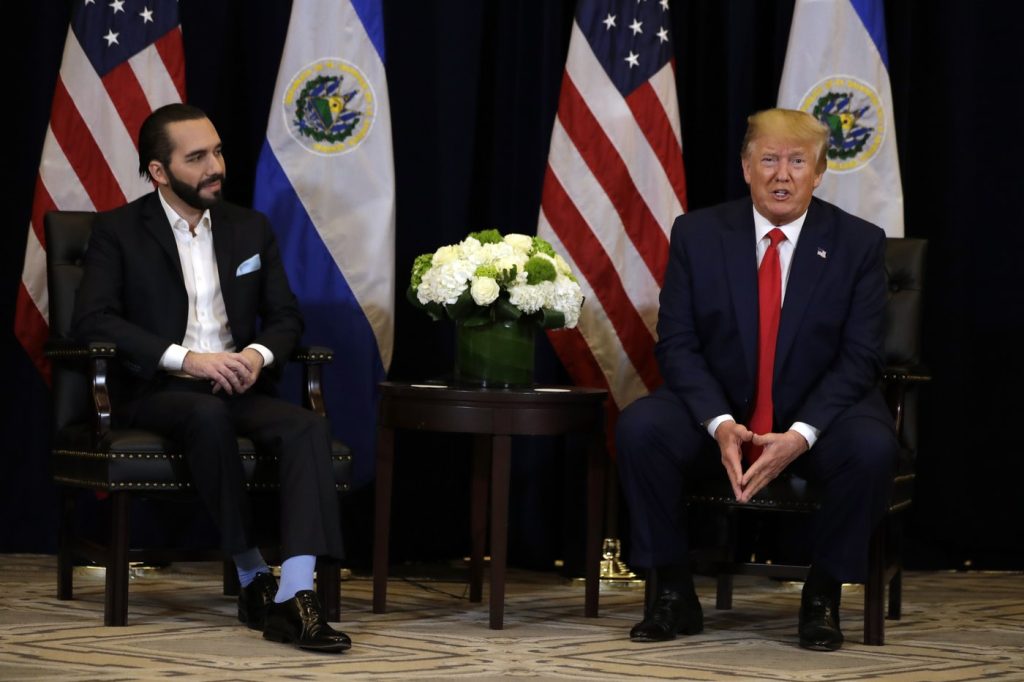On Monday, President Donald Trump is set to host Nayib Bukele, the president of El Salvador, at the White House. This meeting comes as El Salvador has become a crucial partner in the U.S. government's mass deportation operations. Since March, the country has accepted over 200 Venezuelan immigrants accused by U.S. officials of gang-related activities, housing them in a notorious maximum-security prison near the capital, San Salvador.
The Trump administration has been under fire for detaining immigrants, like a Maryland man who was incorrectly deported but has not been returned despite court orders. Bukele, enjoying high popularity in El Salvador due to his aggressive anti-gang measures, is seen as a vital ally in Trump's immigration strategy. The U.S. has provided little proof for its claims regarding the criminal backgrounds of the Venezuelan deportees, nor has it released their names.
During a press conference, Trump praised Bukele’s handling of the situation, stating, “He’s doing really, he’s been amazing. We have some very bad people in that prison.” This endorsement comes as Bukele has arrested over 84,000 individuals during his three-year crackdown on gangs, making him an indispensable collaborator for the Trump administration.
Bukele has struck a financial deal with the U.S. allowing the country to imprison Venezuelan immigrants for a year in exchange for about $6 million. This partnership indicates Bukele's willingness to support Trump’s deportation plans. After a federal judge attempted to halt a deportation flight, Bukele mockingly posted on social media, indicating that it was too late to reverse the situation.
Recently, the U.S. Supreme Court has permitted Trump to utilize the *Alien Enemies Act*, an old law, to carry out deportations, provided the immigrants are given a court hearing beforehand. Over the weekend, ten additional individuals, allegedly linked to notorious gangs like MS-13, were sent to El Salvador as Trump continues his push for stringent immigration measures.
Senator Marco Rubio noted that countries willing to accept dangerous criminals have emerged during discussions, specifically highlighting Bukele's supportive role. Trump has even suggested he would be open toEl Salvador accepting American citizens who commit violent crimes, although the legality of such actions remains ambiguous. Leavitt, a lawmaker, pointed out that these hypothetical citizens would be particularly heinous offenders.
In addition to deportations, the Supreme Court has instructed the Trump administration to facilitate the return of Kilmar Abrego Garcia, a Maryland resident who was deported despite judicial protections against such action. The administration’s current strategy remains unclear, with limited details released regarding the steps being taken to comply with the court's order.
Bukele's crackdown on gangs has been controversial, with El Salvador under a state of emergency for three years, which has suspended some civil rights. The president's focus on addressing gang-related violence has created a complex relationship with the current U.S. administration, particularly as the Biden administration expressed criticism of Bukele's governance style.
Recently, just before Bukele's visit to Washington, the State Department updated its travel advisory for El Salvador, moving it to Level 1, indicating a safer environment for U.S. tourists. The update acknowledged a significant decrease in gang violence and homicides over the past three years, a landmark achievement for Bukele.
As Bukele and Trump navigate these complicated diplomatic waters, their relationship, rooted in policies affecting immigration and security, showcases their similar populist approaches to governance. Both leaders leverage media relationships and respond to political opposition in ways that resonate within their respective constituencies.










